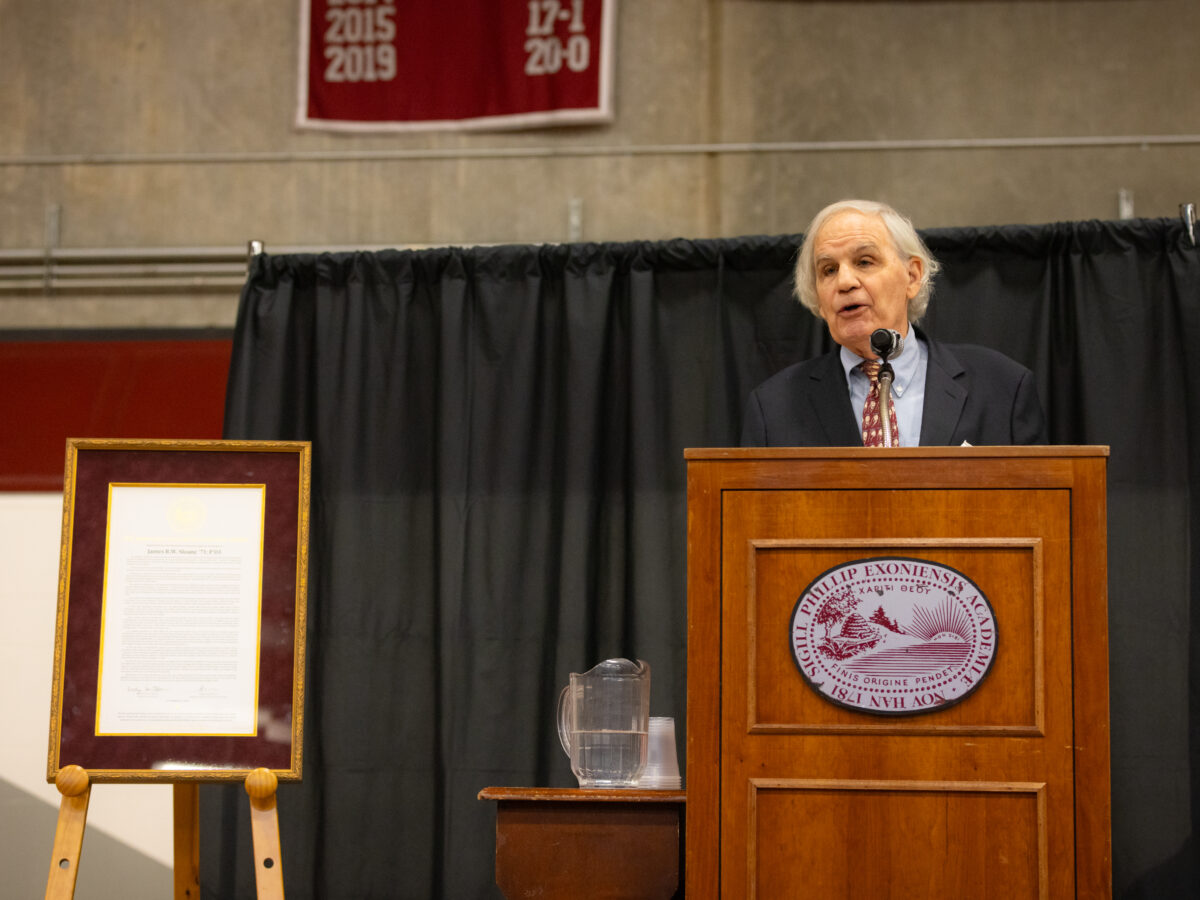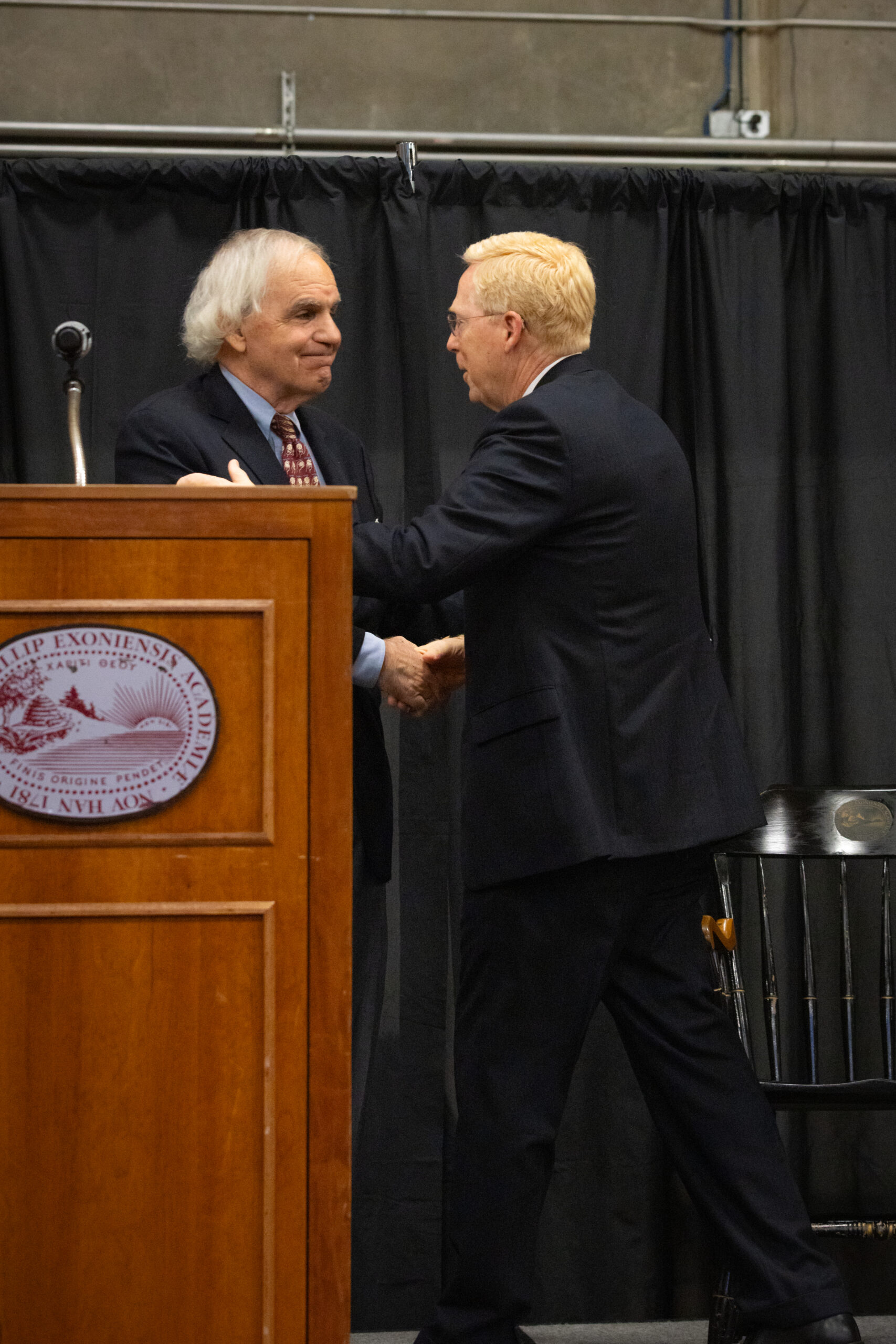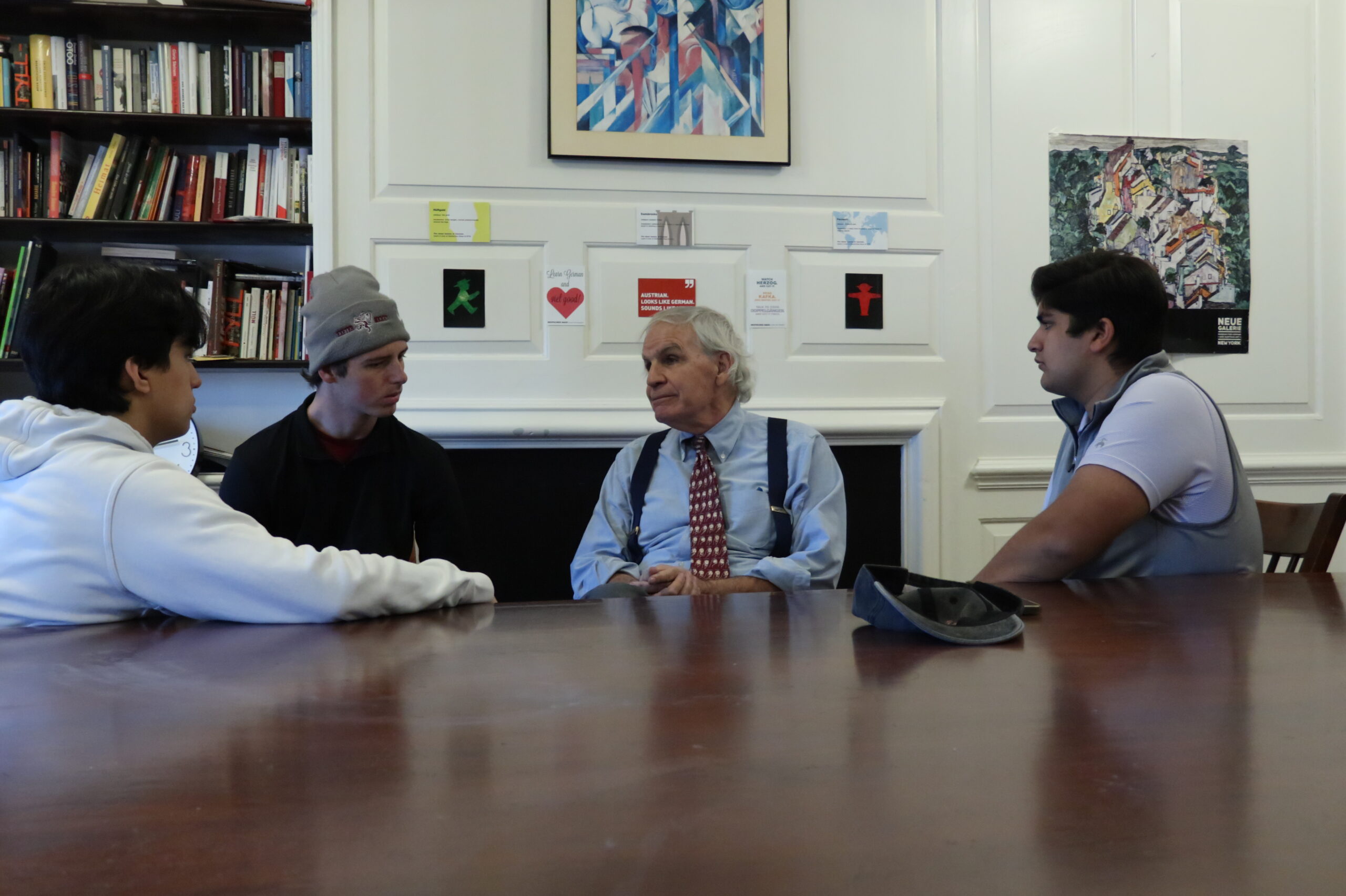Educator and activist honored with John and Elizabeth Phillips Award

Wick Sloane ’71 spoke to an all-school assembly and joined class discussions.
Exeter students, administrators, faculty and Trustees gathered in Love Gym to celebrate the longtime educator and activist James R. W. “Wick” Sloane ’71; P’03, this year’s recipient of the John and Elizabeth Phillips Award. One of the Academy’s highest alumni honors, the Phillips Award is given annually to an Exonian who has contributed significantly to the welfare of community, country or humanity.
“Through your writing and your grassroots activism, you have helped address the challenges facing millions of veterans and low-income college students across the nation,” Sam Brown ’92, trustee and president of the Exeter Alumni Association, read from the award citation.
After a diverse career that included reporting gigs for newspapers and more than a decade of executive roles in the insurance industry, Sloane began working at Bunker Hill Community College in 2006. He started with a nighttime shift in the school’s tutoring center, and later became an adjunct faculty member, teaching late-night classes in the college’s nationally recognized Midnight Classes program. Eventually, Sloane worked as senior special programs coordinator in charge of helping students transfer to four-year colleges.

In all these roles, Sloane went out of his way to support his students, many of whom were juggling school with jobs, family responsibilities and other challenges. “When you discovered that a student hadn’t eaten that day, you bought bread and peanut butter and made them a sandwich,” Brown read from the award citation. “You expanded on those efforts by soliciting donations from local businesses and helping to open a mobile food market on campus.”
Sloane also became a regular contributor to the publication Inside Higher Ed, and wrote extensively about issues facing low-income students like the ones at Bunker Hill, including hunger and homelessness. In 2013, his open letter to then-President Barack Obama asked why the same students eligible for federal free and reduced lunch through high school lost those benefits once they began attending college. Sloane’s work spurred lawmakers to persuade the U.S. Government Accountability Office to conduct the first-ever study of food insecurity at U.S. colleges and universities in 2019, and led to new or proposed legislation addressing the issue at the local, state and federal levels.
“Bring us your trophies and your scars”
Sloane began his remarks by referencing the words of W. Ernest Gillespie, who served as the Academy’s interim principal from 1963–64: “Return often, and show us your trophies and your scars.”
“Those words are my Exeter as much as non sibi,” Sloane continued. “[They] create for each of us the 50/50 expectation that all of us will return here with as many scars as trophies, and scars are often where the trophies come from.”
He shared the story of one of his most prominent “scars” — learning he had been “fired on false charges” from his position as chief financial officer at the University of Hawaii in 2003. By that time, Sloane had already developed a love and respect for community colleges and their students, having interacted with them through the University of Hawaii system. “These are thousands of men and women, not that different from any of us, except they never had a break,” Sloane said. “They never had a break equal even to one day at Exeter.”
At a hearing on higher education in Boston, Sloane met the president of Bunker Hill Community College, one of the largest and most diverse community colleges in Massachusetts. At his persistent urging, she agreed to give him a night shift in the college’s tutoring center.
“I kept showing up, until the chairman of the English department found me and offered me a section of College Writing 1 in D118, a windowless basement classroom at 8:30 on Mondays and Wednesdays,” Sloane recalled. “That first class changed me.”

Fighting hunger — one peanut butter sandwich at a time
Sloane spoke about his students, many of whom faced challenges far beyond those of a typical undergraduate. He and his colleague, Kathleen O’Neill, were managing the school’s emergency assistance fund when they learned many students were going hungry most days, as they couldn’t afford food.
“We weren’t trained as social workers, but that’s what we became because students were hungry,” he said. “We started with peanut butter, jelly, and bread from the supermarket across the street, three blocks from where Paul Revere landed to begin his midnight ride.”
Thanks to donations from local businesses and the Greater Boston Food Bank, Sloane and O’Neill began distributing food on campus, to the tune of more than 700,000 pounds of food since 2012, Sloane said. When they failed to get attention from the state government, they went to federal legislators like Massachusetts Sen. Elizabeth Warren, leading to nationwide program and legislative changes aimed at combating food insecurity.
“[Hunger] has been the injustice I’ve sought to solve,” Sloane told the current Exeter students seated in the gymnasium. “You’ll find your own. You will come across an issue that you simply can’t turn away from — so don’t. Instead, get to work.”
Sloane and Brown were joined onstage by Principal Bill Rawson ’71; ’65, ’70 (Hon.); P’08, a classmate of Sloane’s at Exeter. In addition to speaking in assembly, Sloane joined students in class discussions, visiting a session of the integrated studies course Social Innovation and the religion, ethics and philosophy course Ethics of the Marketplace. He also attended a luncheon with students held at the Class of 1945 Library.